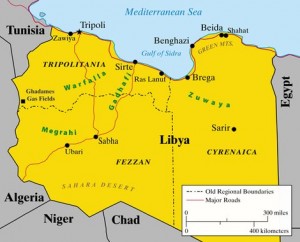Lingering animosity between Libya’s new transitional government and the country’s sub-Saharan neighbours has led some to worry that the region’s energy development could be stifled by a shift in focus northwards.
While Libya and its southern neighbours do not share any substantial transport lines that might affect Central Africa’s export capabilities, many have looked to the financial backing of Tripoli for development projects. However, the support of many of these same countries of the long-standing but now defunct Ghadaffi government has left a void in funding opportunities for refining and pipeline projects.
In 2011, the opening of the US$60 million Djarmaya refinery, located 40 km north of the capital N’djamena, helped turn Chad into a net gas exporter. The two-year project was completed with substantial funding from China, but the country was able to retain its 40% stake in the project thanks to a loan from the Libyan government.
Members of Libya’s transitional government have said on many occasions that the country’s energy and business partnerships will likely favour those players that supported their effort to oust the Ghadaffi government, which would exclude many southern neighbours who had voiced opposition to the rebel movement in 2011.
This divide was on display as Libya’s transitional government sent its first delegation to the annual African Union summit in Addis Ababa, Ethiopia, where leaders from across the continent faced a new financial reality from their northern neighbour.
Instead of offering the same funding promises seen under the Ghadaffi government, Libya’s focus has been on its own reconstruction, including a costly effort to rebuild its refining and transport infrastructure. While production centres were left mainly untouched by both rebel and government forces during the conflict that split the country last year, refineries and transport networks were often targeted, slowing the country’s return to pre-conflict export levels.
As regional leaders pressed for greater intra-African co-operation, with trade between AU member countries at a modest 10%, Libyan leaders downplayed suspicions that the country would turn its attention north to Europe or Asia in search of partnerships, saying that it would invite all interested parties from any country that offered the technology and funding to help rebuild its economic and energy infrastructure.
“Those who support Libya at this moment are taking the initiative of coming to us, for they do have technology, advancement, plans, and they are ready with specific projects. In addition, there is an obligation on the part of Libya because those involved are not new. They are already present here,” Libyan Deputy Minister of Foreign Affairs, Dr Mohammed Abdulaziz, told PANA Press.
While the offer allowed some hope for countries like Egypt and South Africa, others who have long depended on support from Tripoli were left to look elsewhere.
NewsBase was founded in Edinburgh, Scotland, in 1995. Its weekly publications cover oil and gas, unconventional resources, LNG, power, petrochemicals, renewable energy and the carbon market. They provide high-level commentary and analysis on developments in Africa, Asia, Europe, the Middle East, Latin America, North America, Russia and the rest of the CIS.





